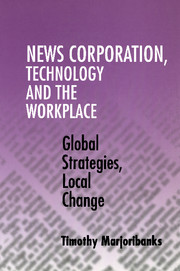Book contents
- Frontmatter
- Contents
- List of Tables and Figures
- Acknowledgements
- Abbreviation
- Introduction: Tales from the Workplace
- Part I Technological Innovation and Workplace Reorganisation: The Newspaper Industry
- Part II Technological Innovation and Workplace Reorganisation: News Corporation
- 4 News Corporation Limited: A Global Media Company
- 5 News International and Wapping
- 6 The Adelaide Advertiser: Wapping South?
- 7 News Corporation in the United States: The Land of Opportunity?
- 8 Conclusion: News Corporation: Combining the Global and the Local
- Bibliography
- Index
5 - News International and Wapping
Published online by Cambridge University Press: 04 August 2010
- Frontmatter
- Contents
- List of Tables and Figures
- Acknowledgements
- Abbreviation
- Introduction: Tales from the Workplace
- Part I Technological Innovation and Workplace Reorganisation: The Newspaper Industry
- Part II Technological Innovation and Workplace Reorganisation: News Corporation
- 4 News Corporation Limited: A Global Media Company
- 5 News International and Wapping
- 6 The Adelaide Advertiser: Wapping South?
- 7 News Corporation in the United States: The Land of Opportunity?
- 8 Conclusion: News Corporation: Combining the Global and the Local
- Bibliography
- Index
Summary
The History Of News International In Britain
By 1998, News International, the British-based company which formed part of News Corporation Limited, held extensive newspaper interests in Britain, as can be seen in Figure 5.1. Its newspaper holdings included the daily newspapers, the Sun which had a daily readership in 1998 of more than ten million, and more than 50 per cent of the daily tabloid market; and The Times which had an average circulation of 793,000 and a readership of more than two million. It also owned two Sunday newspapers, the News of the World with sales of 4.3 million and an average readership of 11.5 million, making it the leader in Sunday newspaper circulation, and the Sunday Times which had a circulation in excess of 1.3 million each week, and 48 per cent of the quality Sunday market (News Corporation Limited 1998).
In addition to these newspaper holdings, News International owned various magazines and inserts published in Britain including the influential Times Supplements; and book publishing interests through its ownership of HarperCollins Publishers. News International had also become a leading company in the area of satellite and pay service television, with 40 per cent ownership of British Sky Broadcasting and total ownership of a number of satellite channels. These holdings have made News International a crucial and immensely influential organisation in the media sector of Britain. The influence of the company, however, has been more widespread than merely securing a large share of the media market. In particular, the approach of the company to technological innovation and processes of workplace reorganisation has been significant in shaping the current state of industrial and workplace relations in Britain.
- Type
- Chapter
- Information
- News Corporation, Technology and the WorkplaceGlobal Strategies, Local Change, pp. 101 - 131Publisher: Cambridge University PressPrint publication year: 2000



